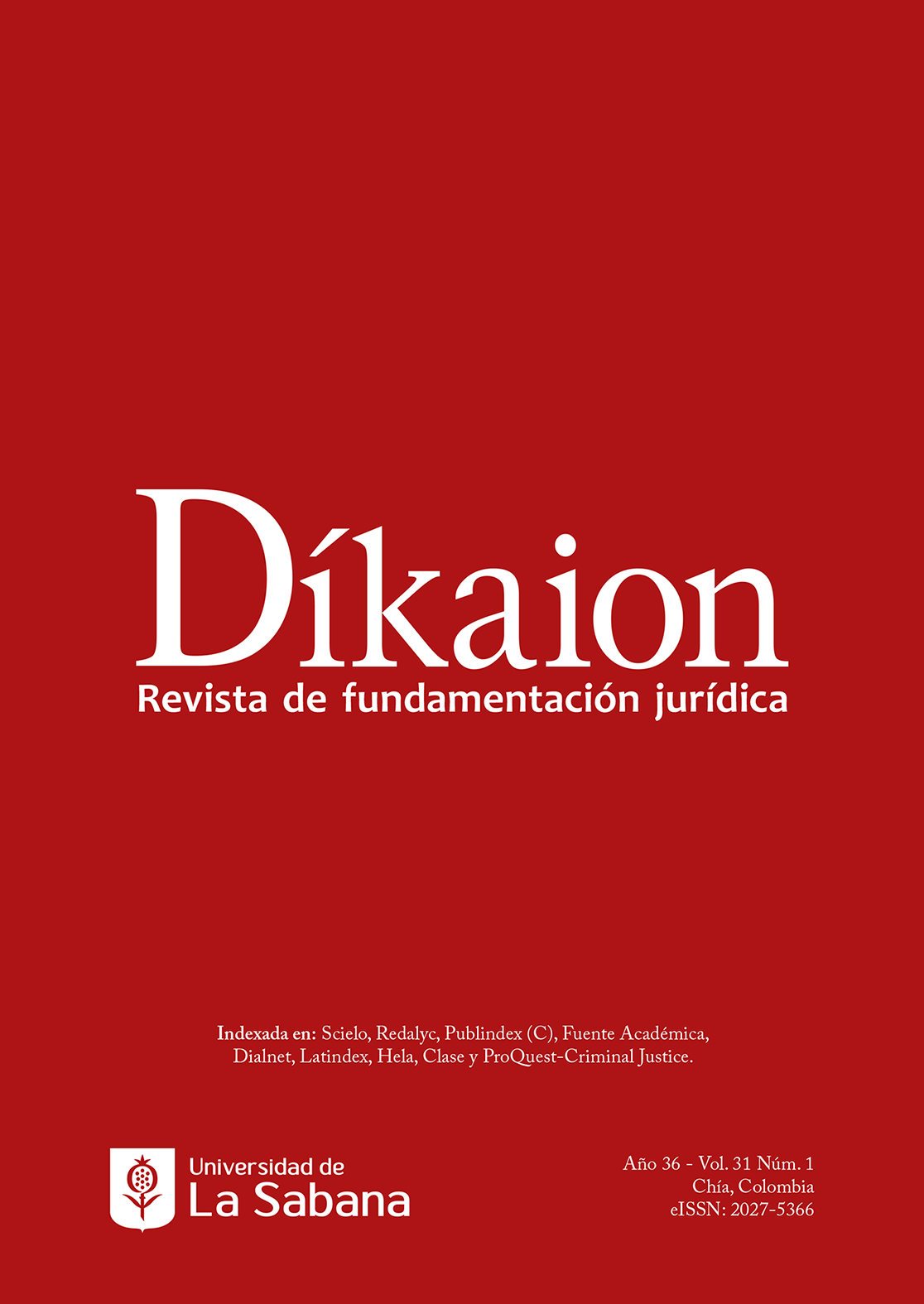Analogy and Intelligibility of Law: Limits of John Finnis’ Methodological Proposal to Conceptualize Law
DOI:
https://doi.org/10.5294/dika.2022.31.1.5Keywords:
Law, John Finnis, analogy, central case, intelligibilityAbstract
A central topic of John Finnis’ legal theory regarding the conceptualization of law as a social phenomenon is the analogy. This methodological proposal supposes relevant advances in recognizing meeting points between solutions to the concept of law by antagonistic iusphilosophical traditions and their potential link with other practical-normative systems. However, the truth is that this aspect of the Finnis’ method requires certain theoretical limits in order not to affect his conceptual scheme systemically. This paper deals with some implications that unlimited use of the analogy carries, confronting it with other significant features of the author’s thought and demonstrating how the systematic vocation of his theoretical elaboration can be impacted.
Downloads
References
Alexy, Robert, “Some reflections on the ideal dimension of law and legal philosophy of John Finnis”, en American Journal of Jurisprudence 58 (2013), pp. 1-14. https://doi.org/10.1093/ajj/aut009
Alexy, Robert, La doble naturaleza del derecho, Madrid, Trotta, 2016.
Beiner, Ronald, What’s the matter with the Liberalism?, University of California Press, 1992, pp. 63-66. https://doi.org/10.1525/9780520328709
Dworkin, Ronald, Taking Rigths Seriosly, London, Duckworth, 1977.
Finnis, John, Aquinas. Moral, Political and Legal Theory, Oxford, Oxford University Press, 1998.
Finnis, John, “Aristóteles, Santo Tomás y los Absolutos Morales”, en Estudios de Teoría de Derecho Natural, México, UNAM, Instituto de Investigaciones Jurídicas, trad. Carlos Ignacio Massini-Correas, 2017.
Finnis, John, “Law and what i truly should decide”, en American Journal of Jurisprudence (2003). https://doi.org/10.1093/ajj/48.1.107
Finnis, John, Natural Law and Natural Rights, Oxford, Oxford University Press, 2011.
Finnis, John, “Natural law theories”, en Edward Zalta N. (ed.). The Stanford Encyclopedia of Law, 2011 (última revisión 2015), en http://plato.stanford.edu/entries/natural-law-theories. Ap.4
Finnis, John, “Sobre la incoherencia del positivismo jurídico”, en Estudios de Teoría del Derecho Natural, Supervisión de Carlos Ignacio Massini-Correas, México, Universidad Autónoma de México, Instituto de Investigaciones Jurídicas, trad. Carolina Pereira Saez. 2017.
Gambra, José Miguel, La analogía en general. Síntesis tomista de Santiago Ramírez, Pamplona, EUNSA, 2002.
Glendon, Mary Ann, Rigths Talk. The Impoverishment of Political Discourse, New York, The Free Press, 1991.
Gómez Lobo, Alfonso, Los bienes humanos. Ética de la ley natural. Santiago de Chile, Mediterráneo, 2006, pp. 83-109
Grisez, Germain, Joseph Boyle y John Finnis, Nuclear Deterrence, Morality and Realism, Oxford, Oxford University Press, 1987.
Hart, Herbert L. A, Essays in Jurisprudence and Philosophy, Oxford, Clarendon Press, 1983. https://doi.org/10.1093/acprof:oso/9780198253884.001.0001
Hart, Herbert L. A., Essays on Bentham. Studies in Jurisprudence and Political Theory, Oxford, Clarendon Press, 1982.
Hart, Herbert L. A., El concepto de derecho, Buenos Aires, Abeledo Perrot, trad. Genaro Carrió, 1992.
Legarre, Santiago, “The concept of Law in John Finnis”, Persona & Derecho 40 (1999).
Mackie, John L., “Obligation to obey the law”, en Virginia Law Review 61 (1) (1998), pp. 143-158. https://doi.org/10.2307/1072837
Massini-Correas, Carlos Ignacio, Facticidad y razón en el derecho. Análisis crítico de la iusfilosofía contemporánea, Buenos Aires, Marcial Pons, 2015.
Pereira Saez, Carolina, La autoridad del derecho. Análisis crítico de la posición de J. M. Finnis, A Coruña, Universidad de A Coruña, s. f.
Rawls, John, A Theory of Justice, Cambridge, Cambridge University Press, 1971.
Raz, Joseph, La ética en el ámbito de lo público, Barcelona, Gedisa, trad. M. L Melón, 2001.
Sandel, Michael J., “Political liberalism”, Harvard Law Rewiew 107 (1994), https://doi.org/10.2307/1341828
Sartorius, Ralph, “Political authority and political obligation”, en Virginia Law Review 61 (1) (1998), pp. 3-17. https://doi.org/10.2307/3504969
Zambrano, Pilar, “Principios fundamentales como determinación de los principios morales de justicia. Una aproximación desde la distinción entre la perspectiva de la moral y la perspectiva jurídica de especificación de la acción humana”, Instituto de Investigaciones Jurídicas, México, UNAM, s. f., pp. 87-118.
Zambrano, Pilar, “Principios fundamentales e inteligibilidad del derecho. Entre un realismo semántico y una teoría objetiva del bien y de la acción”, en Dikaion 23 (2) (2014), pp. 423-445. https://doi.org/10.5294/dika.2014.23.2.8
Published
How to Cite
Issue
Section
License
Copyright (c) 2022 Díkaion

This work is licensed under a Creative Commons Attribution-ShareAlike 4.0 International License.
1. Proposed Policy for Journals That Offer Open Access
Authors who publish with this journal agree to the following terms:
This journal and its papers are published with the Creative Commons License Attribution-NonCommercial-NoDerivatives 4.0 International (CC BY-NC-ND 4.0). You are free to share copy and redistribute the material in any medium or format if you: give appropriate credit, provide a link to the license, and indicate if changes were made; don’t use our material for commercial purposes; don’t remix, transform, or build upon the material.










